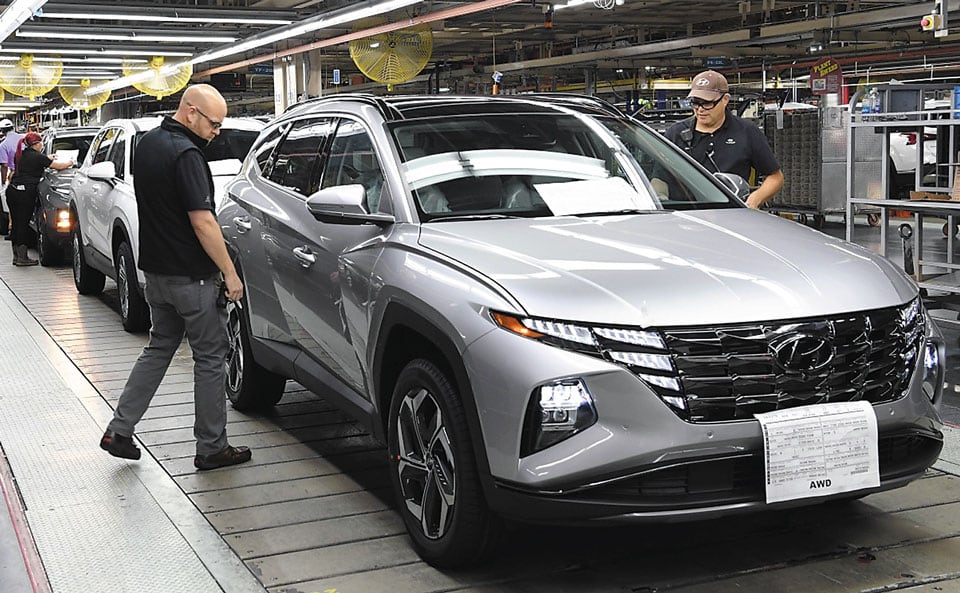Unggulan
- Dapatkan link
- X
- Aplikasi Lainnya
Trump Tariffs and Domestic Pressures Drive Korean Firms to Invest $102B in U.S.

South Korean conglomerate Hyundai Motor Group said it will invest $21 billion in the United States over the next four years, including a new $5.8 billion steel plant in the southern state of Louisiana.
On March 24, Hyundai Chairman Chung Eui-sun revealed the company’s investment plan during an event at the White House with President Donald Trump and Louisiana Governor Jeff Landry present. The funds will be distributed as follows: $8.6 billion for automotive manufacturing plants, $6.1 billion for steel production facilities, components, and logistics operations, and $6.3 billion toward emerging technology areas and renewable energy projects.
Hyundai’s declaration arrives mere days prior to Trump implementing fresh reciprocal tariffs on trade partners. This action has heightened anticipation that other major South Korean corporations such as Samsung, SK, LG, POSCO, and Hanwha might also decide to take similar steps.
A few days prior, on March 21, Hanjin Group Chairman Cho Won-tae inked a deal to acquire aircraft and services valued at $32.7 billion from Boeing and GE Aerospace.
A high-ranking industry executive stated, "While Hyundai and Korean Air are pursuing these investments from a business standpoint, they're also presenting what’s referred to as 'gifts' that align with Trump's interests." The official added, “In light of this, several firms are currently assessing comparable U.S. investment strategies aimed at cultivating an advantageous commercial climate during the nascent phase of the incoming administration.”
The Hyundai Motor Group has been expanding its manufacturing overseas, with this trend accelerating following the 1997 Asian financial crisis. Since finishing construction of the Asan plant in 1996 and the Kia Hwaseong plant in 1997, Hyundai Motor hasn’t established any additional assembly facilities within South Korea for almost thirty years. Over time, the company’s output capability domestically has decreased as well. During the early 2010s, both Hyundai and Kia together could produce around 3.5 million cars annually; however, their current yearly capacity stands at approximately 3.15 million units due partly to limitations imposed by the nation's 52-hour work week regulation.
The semiconductor industry, which forms the backbone of South Korea’s economy, is progressively expanding abroad as well. Samsung Electronics plans to invest more than $37 billion in constructing two fabrication plants and an R&D hub in Taylor, Texas. Meanwhile, the SK Group intends to allocate approximately $22 billion towards building a packaging facility for high-bandwidth memory (HBM) and an electric vehicle battery factory in Indiana and Georgia.
LG has pledged $20 billion to construct a home appliance plant in Tennessee and a battery plant in Georgia. Hanwha has allocated $2.2 billion to build a solar module factory and acquire a shipyard in Philadelphia.
Together with Hyundai's contribution, South Korea's large business groups have committed over $102.2 billion in investments within the United States.
Such extensive investments aren’t confined to big corporations shifting their activities to the United States. For instance, when Hyundai established an electric vehicle facility in Georgia, related entities such as Hyundai Mobis and various small suppliers manufacturing components like brakes, consoles, and door systems followed suit. This move essentially relocated the complete electric vehicle supply chain to the American market.
Although Trump’s protectionist trade policies impacted Hyundai’s investments, numerous Korean firms also cite Korea’s growing anti-business environment, stringent regulations, and powerful labor unions as primary motivations for seeking expansion overseas.
For example, the semiconductor industry has consistently sought waivers from the 52-hour workweek limit specifically for research and development activities, yet this proposal is still stuck in the National Assembly. Additionally, the Strict Accident Penalty Act acts as an obstacle that pushes Korean enterprises abroad and discourages international corporations from setting up operations in South Korea. There have also been repeated calls to revise high estate taxes, which are seen as problematic for numerous businesses; however, these appeals have mostly fallen on deaf ears.
- Dapatkan link
- X
- Aplikasi Lainnya
Postingan Populer
National Gallery of Zimbabwe Set to Showcase 80 Photographic Masterpieces
- Dapatkan link
- X
- Aplikasi Lainnya
Nepal: A Golden Land for Content Creators
- Dapatkan link
- X
- Aplikasi Lainnya
Komentar
Posting Komentar